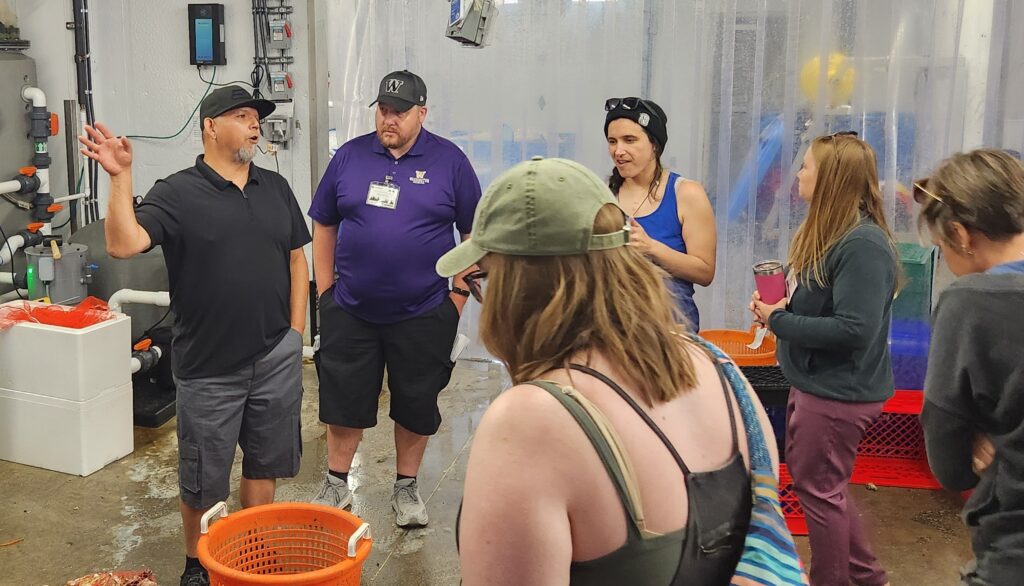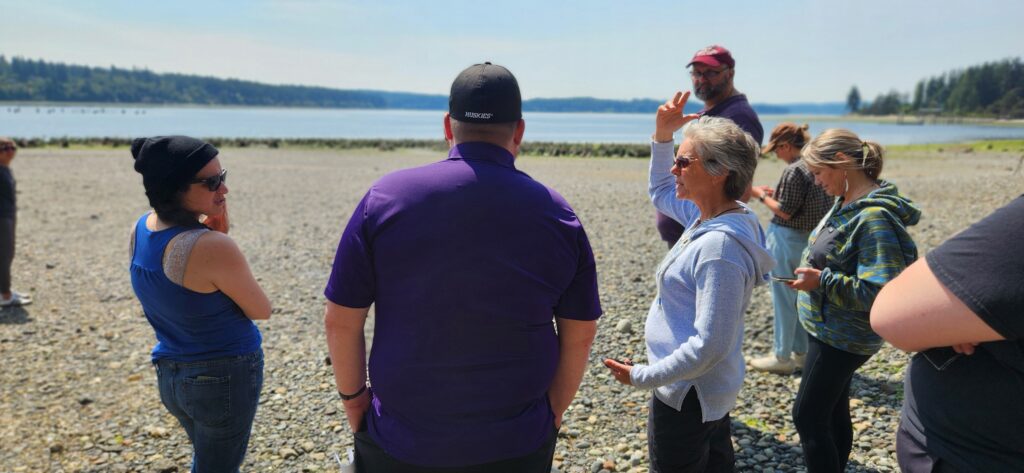Some environmental impacts on Washington’s Tribes are more obvious than others. The Quinault Nation, for example, is in the process of moving an entire village uphill due to sea level rise. But other issues can be harder to spot, even though they are just as threatening to sovereign nations’ way of life. The Suquamish Tribe’s Chico Creek project is a case in point.
This June, twenty-five teachers from Kitsap and King counties learned about the project, how it relates to tribal sovereignty, and how transportation decisions can lead to environmental justice issues when they are made without full consideration of treaty rights and ecological factors.
The two-day ‘Tribes and Climate Change’ workshop offered a rare opportunity for regional teachers to learn how the Suquamish Tribe is both adapting to and combating climate change, and to ask questions of Suquamish Tribal leaders. Participants also explored This is Indian Country’s Tribes and Climate Change curriculum along with PEI’s climate education resources.
The group spent the first morning hearing directly from Suquamish Tribal Chair, Leonard Forsman and Squaxin Tribal Chair, Kris Peters about the Tribe’s history and recent climate mitigation projects. “They were incredibly gracious with their time,” says Molly Griffiths, Associate Director of Puget Sound at PEI. “The Tribal Council answered a ton of questions, which was wonderful for the teachers. How often do you get to have a large amount of time with a Tribal Council to ask great and poignant questions?”
“I will be incorporating more specific information in my unit on climate change related to both the impacts on local Indigenous people and what tribes are doing to adapt and mitigate.”
–Workshop Participant
The group spent the afternoon in break-out groups, exploring curriculum and planning to implement their learning in the classroom. The next morning, they headed to Chico Creek, a multi-year culvert restoration

and road reroute project to restore fish habitat threatened by existing culverts. Finfish Program Manager Allison O’Sullivan and Suquamish Tribe Shellfish Manager Vivianne Berry shared key features of the fish passage, including adding native plants and rerouting roads.
For decades, the state had built culverts that blocked fish passage to and from Tribal fishing grounds, leading to severely depleted salmon populations. This violated the rights guaranteed in treaties with the U.S. government, and multiple Tribes sued. In 2013, a district court issued a permanent injunction requiring the state of Washington to provide and maintain fish passage for salmon at numerous culverts under state-owned roads, resulting in approximately 1,000 miles of additional stream habitat for salmon.
Chico Creek posed challenges beyond replacing culverts. The Suquamish Tribe had to remove existing roads and build a new road to homes that would otherwise be inaccessible. The whole project took 15 years and cost over $50 million.
From there, the group got a tour of Suquamish Seafoods and learned that China is the biggest market for the company’s geoducks, with shipments traveling from Kitsap County to mainland China in less than 24 hours. They also visited oyster bags (and a lounging elephant seal!) and heard about predators who can endanger them. Recently, the most danger has come from climate change. Heat domes have become increasingly common, leading to a 40% loss of oyster harvest during the last major event. “The gentleman at the fishery was great and he gave real insight into the impact of current political events,” one participant shared in an evaluation.
The afternoon brought a tour of Chief Seattle’s grave, a veteran’s memorial for Suquamish Tribal members who fought in foreign wars including former Suquamish Tribal Chairman Charles Lawrence – the father of guest presenter Barbara Lawrence, a Tribal Elder and Traditional Storyteller. Then came a panel titled ‘Everything You Ever Wanted to Know About Tribes but Were Afraid to Ask’ and a workshop wrap-up.
“I want to integrate the workshop learnings into the classroom this fall,” said one. “I also want to be able to contact the local Tribes to support our students in learning about climate change and community.”
“I will be incorporating more specific information in my unit on climate change related to both the impacts on local Indigenous people and what tribes are doing to adapt and mitigate,” another shared.
The workshop was funded through a Front and Centered grant from the Washington State Department of Transportation, with additional support from Port Madison Enterprises, Washington Wild, ClimeTime, and the Suquamish Tribe.
